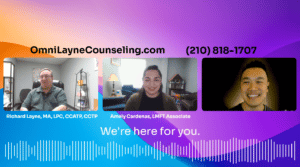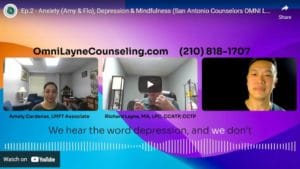Show Notes
[00:00:00] Sherman Hu: Welcome to today’s 10-minute podcast powered by OMNI Layne Counseling. We have Richard Layne and Amely. Am I pronouncing it right? Cardenas.
[00:00:10] Amely Cardenas: Cardenas.
[00:00:11] Sherman Hu: Okay. All right.
[00:00:12] Amely Cardenas: Close.
[00:00:12] Sherman Hu: That’s great. Welcome. I’m excited to kick off this podcast with you. This is our inaugural episode. And so Richard, let me start with you first.
Where is the OMNI Layne Counseling clinic located in San Antonio, Texas?
[00:00:21] Sherman Hu: Where is OMNI Layne Counseling located in San Antonio, Texas?
[00:00:27] Richard Layne: OMNI Layne Counseling is located in the great city of San Antonio, Texas. We are at 3740 Colony Dr # 122, San Antonio, TX 78230.
Do you offer Telehealth Video Counseling services?
[00:00:41] Sherman Hu: Okay, perfect. I know that you serve many clients from your office there, but you also serve them remotely, yeah, Amely?
[00:00:50] Amely Cardenas: Yes, we do have Telehealth services. We do it through Zoom and I know some counselors also do it by phone, if need be.
[00:00:59] Sherman Hu: Okay. And has that been a very popular option over the last two years?
[00:01:04] Amely Cardenas: Yes. With COVID and working from home, everyone is finding ways to lessen their load, especially with a busy schedule. So being able to hop on a computer and not leave your home is a very big perk for Telehealth.
Pros and Cons for Telehealth from a Therapist’s Point-of-View
[00:01:21] Sherman Hu: I’m curious. Richard, when you are serving a client in a session, in-person versus Telehealth, what are your observations of the two different environments or platforms? Does it translate well? Does it, are clients excited about (Telehealth)?
[00:01:41] Richard Layne: Yeah, I really think it translates well. This is a big deal amongst counselors. Some like it, some don’t. Mostly you hear people really like Telehealth. But the only difference is right now, you can usually only see from here (waist) on up.
[00:01:58] Richard Layne: That’s the only real drawback because we’re looking for all kinds of body signs from a client. For instance, are the legs shaking? Bouncing? What is it they’re doing? For instance are they doing this the entire time? There are many things that go into our assessment, not just what the client tells us, but actually we were observing as well.
[00:02:22] Amely Cardenas: Sometimes their facial features don’t show up.
[00:02:27] Sherman Hu: Overall, it’s served you well, along with the client?
OMNI Layne Counseling’s Experience With Telehealth
[00:02:33] Richard Layne: Absolutely. And let me say one more thing about Telehealth as well. Most people started using, counselors anyway, started using Telehealth in 2020. We’ve actually been Telehealth services for two years before 2020.
[00:02:48] Richard Layne: So we were very versed in it (Telehealth) when it came around, we were absolutely 100% set up and ready for it. So we have at least two more years of experience doing Telehealth, then other counseling organizations or counselors.
Most people started using, counselors anyway, started using Telehealth in 2020. We’ve actually been Telehealth services for two years before 2020. So we were very versed in it (Telehealth) when it came around, we were absolutely 100% set up and ready for it. So we have at least two more years of experience doing Telehealth, then other counseling organizations or counselors.
Richard Layne, Founder & Clinician
Which services have been a focus since the beginning of 2022?
[00:03:04] Sherman Hu: That’s brilliant. Would you share with me the range of services that OMNI Layne Counseling offers and what seems to be a focus since the beginning of the year?
[00:03:16] Amely Cardenas: With everything going on with COVID, a lot of the clients I see are children, and they’re transitioning back to in-person school. And it’s very different. Clients that started kindergarten during COVID don’t know exactly what school is supposed to look like. As well as adults that are going back to work physically in person.
[00:03:39] Amely Cardenas: That is a big… Those life transitions that were very unexpected for everyone is a big one that I’ve seen a lot. And of course we’re going to have our ADHD or depression or anxiety, but the isolation in transitions have been the biggest ones we’ve seen in terms of clients looking for services.
Those life transitions that were very unexpected for everyone is a big one that I’ve seen a lot. And of course we’re going to have our ADHD or depression or anxiety, but the isolation in transitions have been the biggest ones we’ve seen in terms of clients looking for services.
Amely Cardenas, LMFT Assoc.
[00:04:00] Richard Layne: As far as client populations are concerned, we serve anywhere from usually three years old to 100 years old, actually. We see Medicare clients. We have counselors who can see Medicaid clients. Regular insurance. We have a wide range here. We can see people with trauma issues. We can see people with depression issues, anxiety issues, panic attack issues. We can see people with special issues, sometimes for example, autism. We can do as well.
Dialectical Behavior Therapy (DBT) type
[00:04:35] Richard Layne: Amely, if I’m not mistaken, you have a certification to do that Dialectical Behavior Therapy (DBT), correct?
[00:04:42] Amely Cardenas: Yes, I do. It’s a little bit more specific and a little bit more structured in terms of, I think it’s a little bit more strict, because in order for things to go in the path that the theory is working with, you have to really be committed to it.
[00:05:02] Sherman Hu: Okay.
[00:05:02] Richard Layne: And both the therapist and the counselee, need to be very structured during the sessions, during the homework, everything else.
[00:05:14] Sherman Hu: Amely, can you unpack that for me? Tell me the theory again, what’s the therapy type that you’re referring to.
[00:05:20] Amely Cardenas: So it’s dialectical behavioral therapy. DBT is looking for skills like mindfulness, emotional regulation, as well as those coping skills. And in the whole session, not only are you putting coping skills to the behavior, but you’re also looking at this behavior, what skill can we use as well as it’s a lot of targeting and tracking these behaviors.
[00:05:47] Amely Cardenas: So a lot of the time, I’ll give a behavior tracker so that they can monitor, “Hey, did we do a lot of lying this week? Did we have a lot of moments of contact issues? Not wanting to listen to parents?” And things like that. So it’s very structured in the terms of, you have to be very honest about the behaviors.
[00:06:09] Amely Cardenas: If you’re not , and you don’t turn in the homework, “Where’s that commitment? Where’s your effort level? Are you being completely honest about the behaviors that you wrote down? Or the lack of behaviors that you didn’t write down?”
[00:06:22] Sherman Hu: Okay. I’m the client or the patient, and I engage in DBT with you. And I’m wondering why this therapy type, maybe over another? Let’s say talk therapy.
[00:06:33] Amely Cardenas: For starters, not only are you going to be able to identify what’s going on. For a lot of kids, “What was the behavior or what was that feeling that was happening when you did this?”
[00:06:44] Amely Cardenas: And a lot of the times kids are like, “Oh, I don’t know. Like I don’t remember.” So the tracker, in that moment, you can write down, ” I was feeling a little bit suicidal. I was feeling angry. Because I felt this, I did this.”
[00:06:59] Amely Cardenas: It’s a lot of identifying, now with a little bit of coaching, in terms of coping skills, it’s now attaching that so it makes that connection of “when this happens, I need to do this” in order to emotionally regulate.
[00:07:17] Sherman Hu: Okay.
[00:07:17] Amely Cardenas: If I’m able to use some mindfulness, which is being in the present, and taking a second to breathe and really just, “Hey, I’m okay. Let me look at my surroundings. Let me focus on something else that’s not making me upset or not making me angry.”
[00:07:33] Amely Cardenas: And that connection is built versus it’s very blocky, like, “I’m feeling this, but I don’t know what to do.” Or “I’ve done this, but I don’t know when to do this.” The client may no t know when to incorporate coping skills.
[00:07:50] Amely Cardenas: And of course I always tell my clients the best time to practice those coping skills is when you’re calm. But also when things happen, it’s okay, now you’ve practiced them so much. Now let’s do it when you’re upset or when something isn’t going the way you planned it. So it’s very much trying to bridge that connection between the two.
[00:08:15] Sherman Hu: You’ve had great success with younger clients with DBT.
Final Words To Wrap Up This Episode
[00:08:20] Sherman Hu: Okay. Brilliant. Any final comments from today’s episode, Amely, that you’d like to share?
[00:08:28] Amely Cardenas: Yeah, OMNI Layne Counseling is here for you. I think the biggest step in terms of finding the goals or accomplishing your goals is to either, start by listening to our podcast or by, looking a little bit more about what therapy could mean for you.
[00:08:47] Amely Cardenas: Or even just giving us a call and making that first appointment. Those are major steps into the right direction.
[00:08:54] Sherman Hu: Richard, any final words?
[00:08:57] Richard Layne: Yes. Also here at OMNI Layne Counseling, we have 12 counselors right now. Unfortunately like everybody else, we were full. Okay. But we can do our best to get you in as soon as possible.
[00:09:11] Richard Layne: We have a waiting list that we work with sometimes. And sometimes we can get you in immediately. It just depends on the situation.
[00:09:20] Richard Layne: We have both male and female counselors. We work with children and adults. And we have been very successful with our clientele over the years. OMNI Layne Counseling has been in business for approximately 15 years right now.
[00:09:38] Sherman Hu: That’s great. On behalf of Richard and Amely, thank you for watching or listening to this podcast. And join us next week, as we continue again with the next episode from OMNI Layne Counseling.



